Charles E W Bean, Diaries, AWM38 3DRL 606/61/1 - October 1916 - Part 6
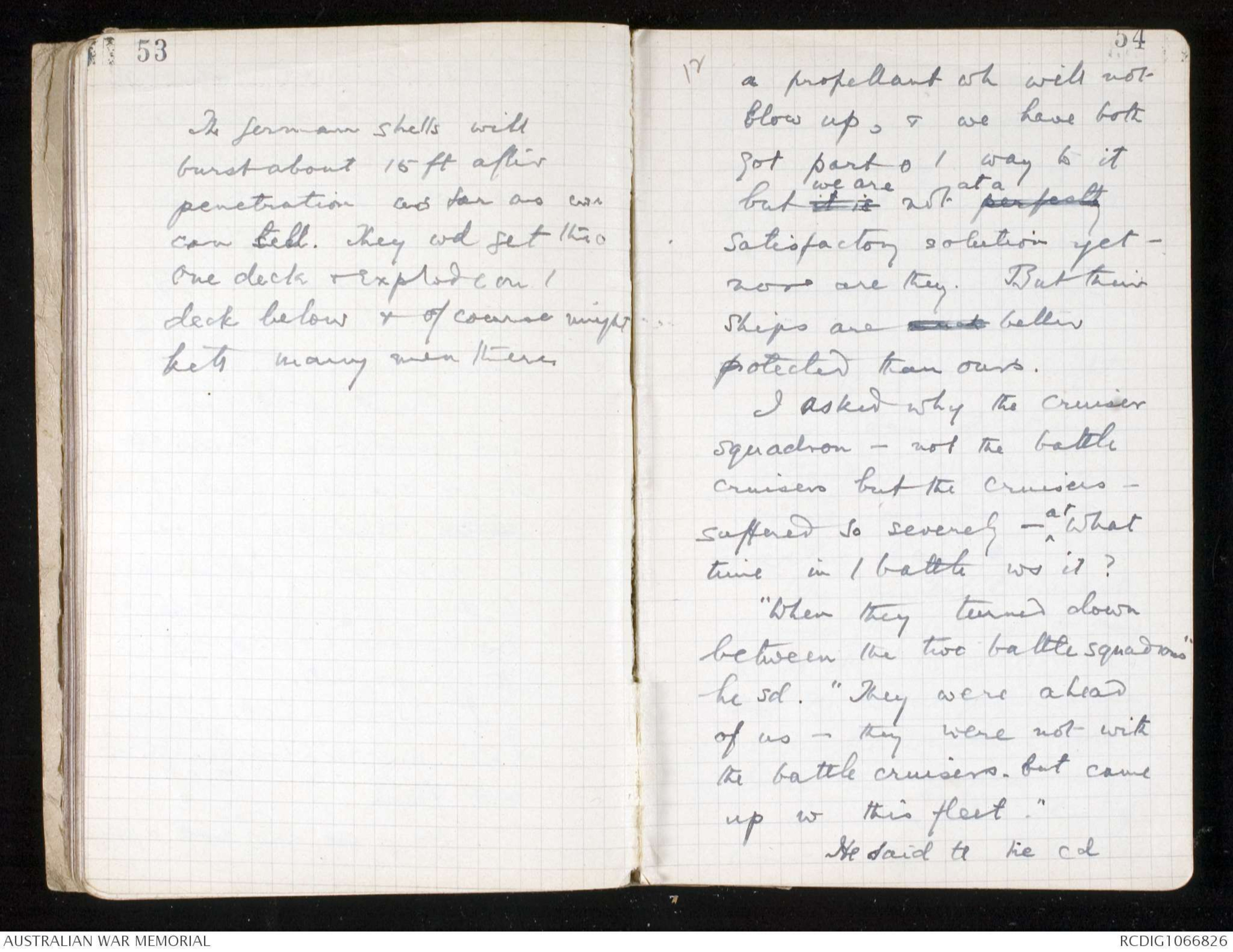
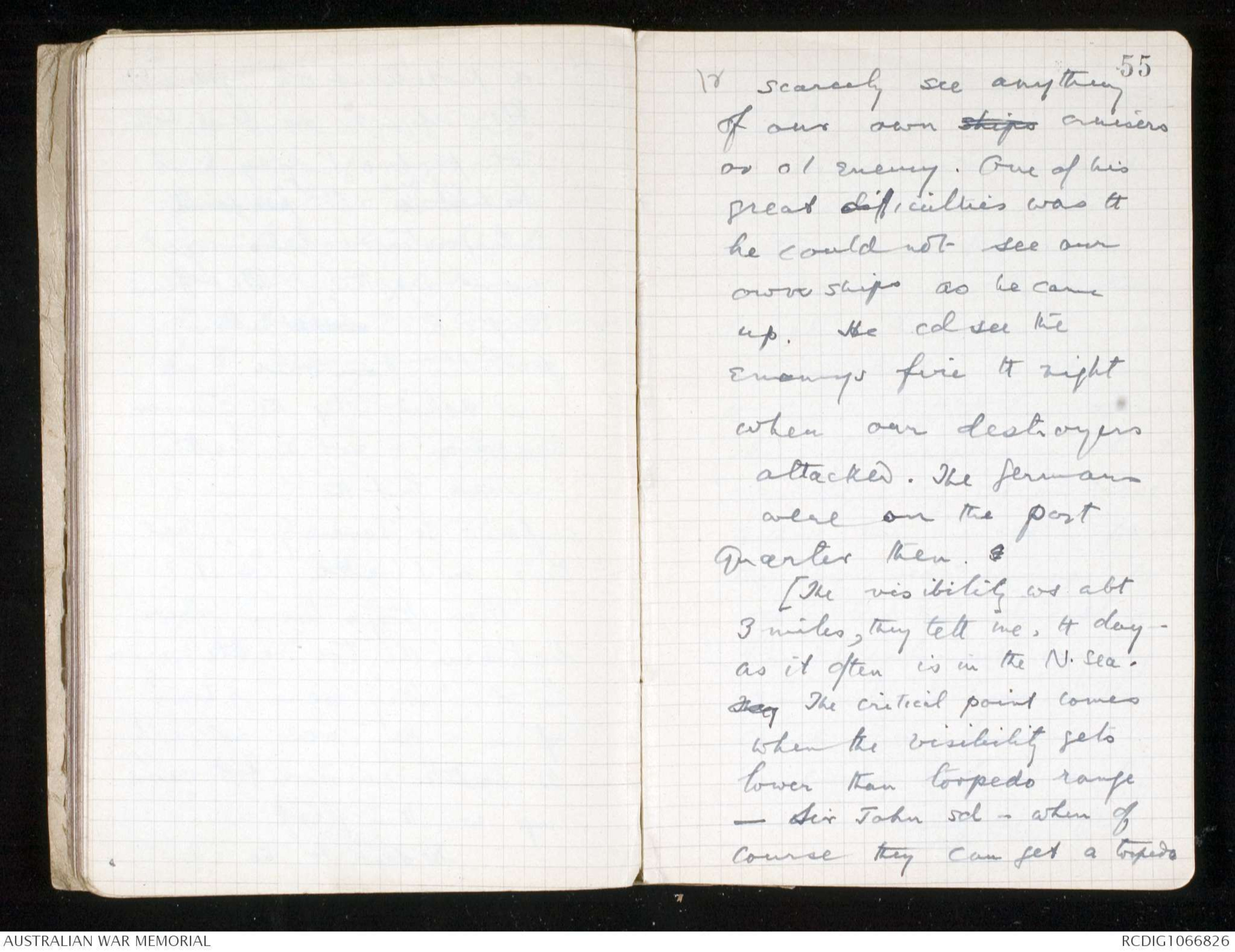
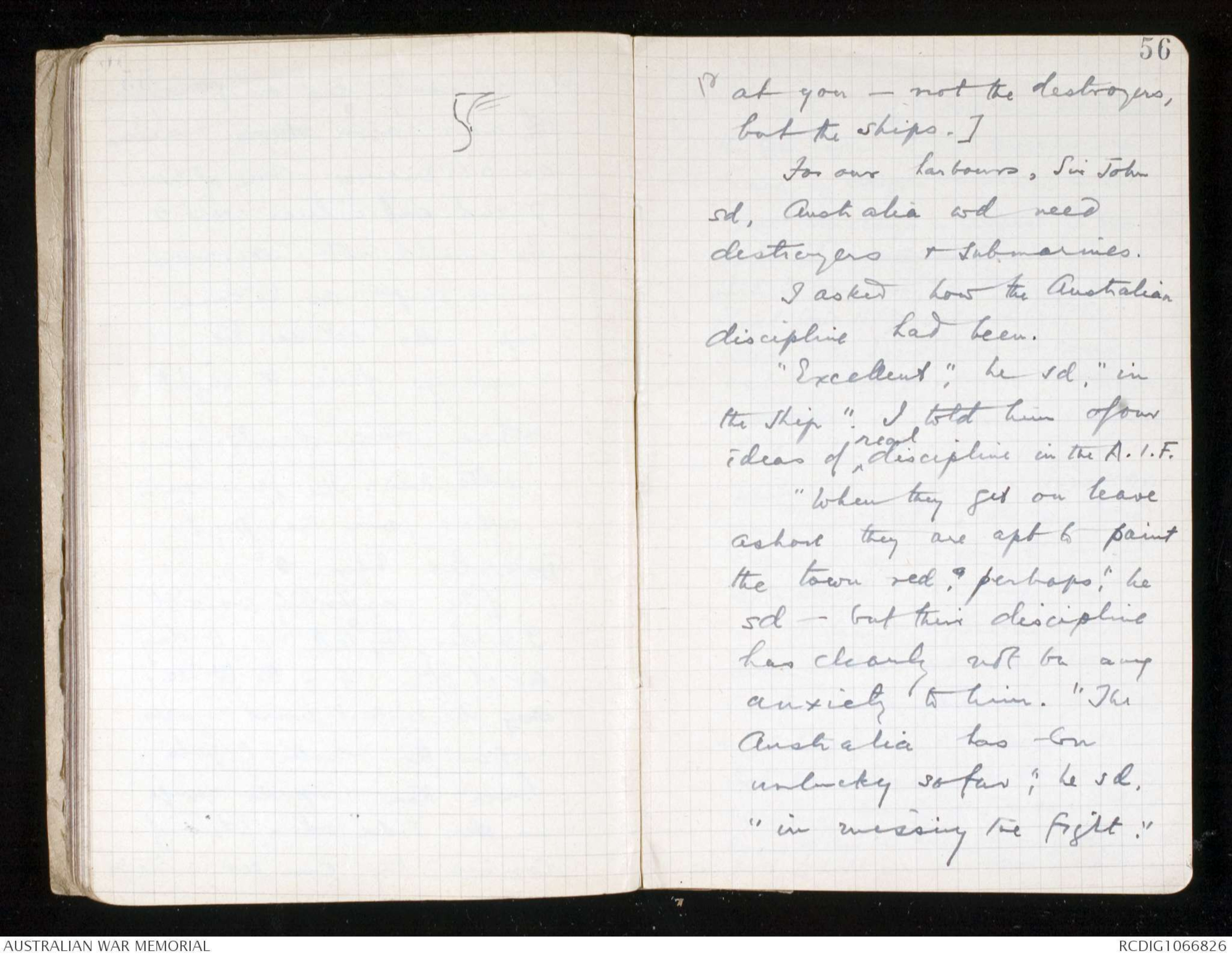
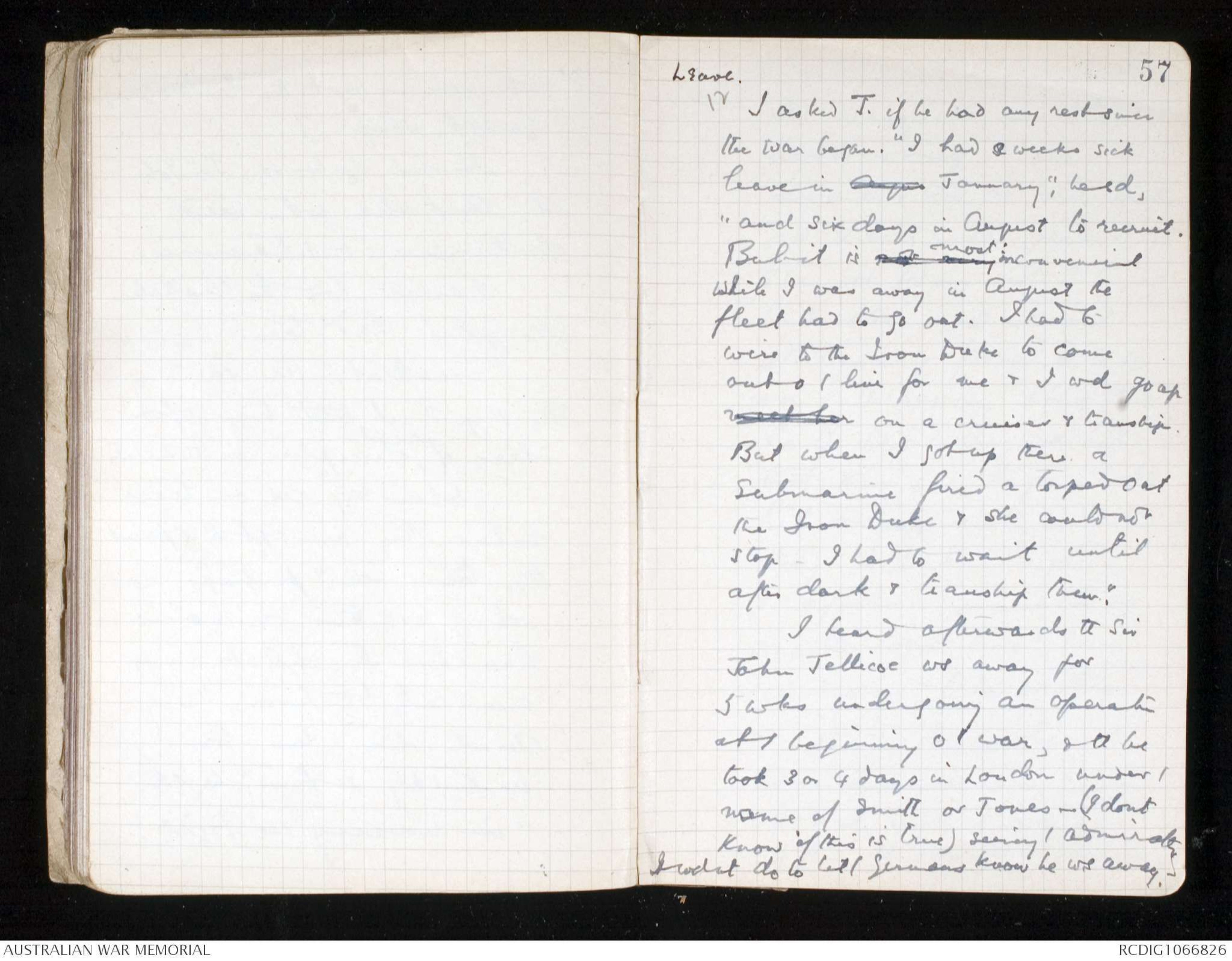
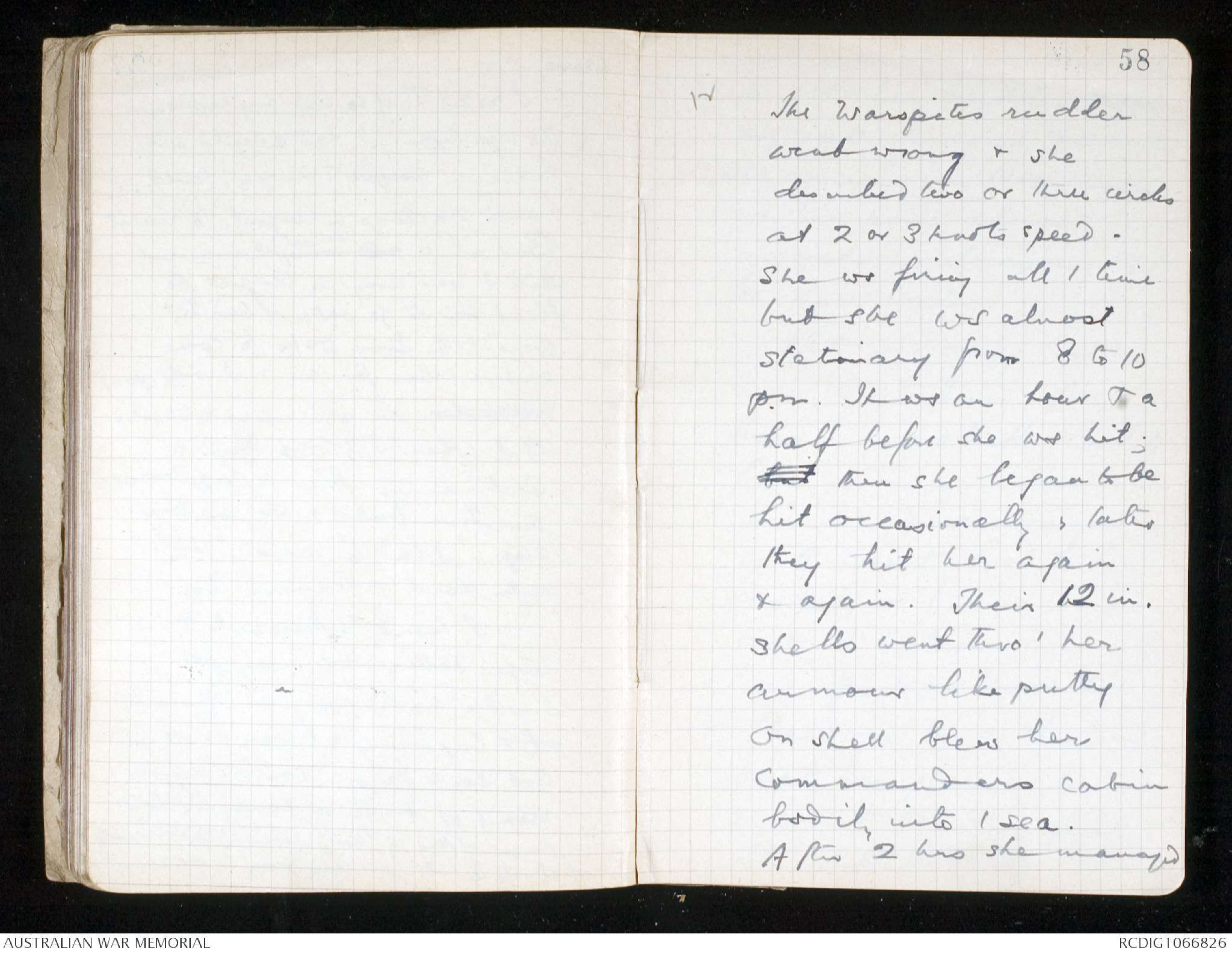
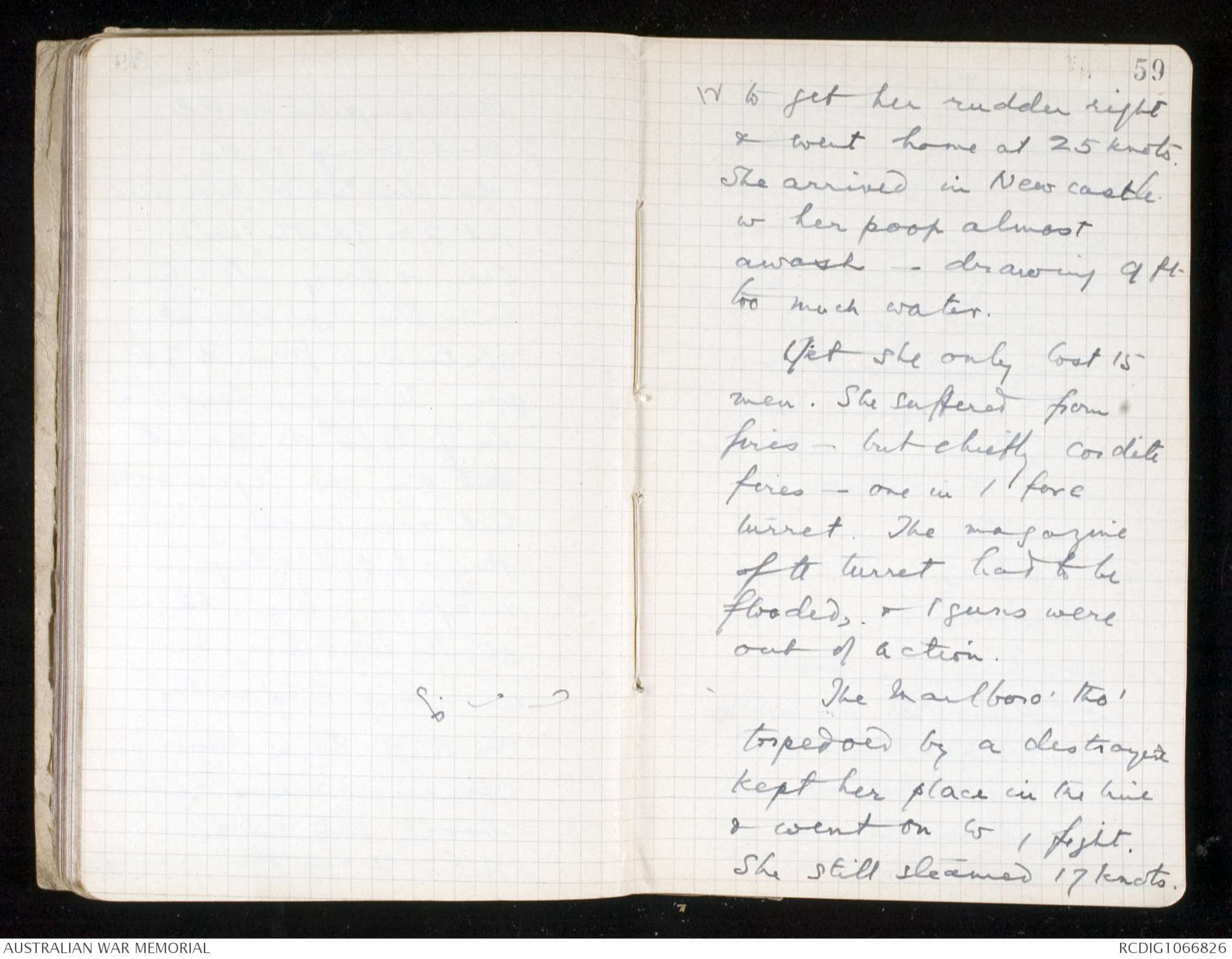
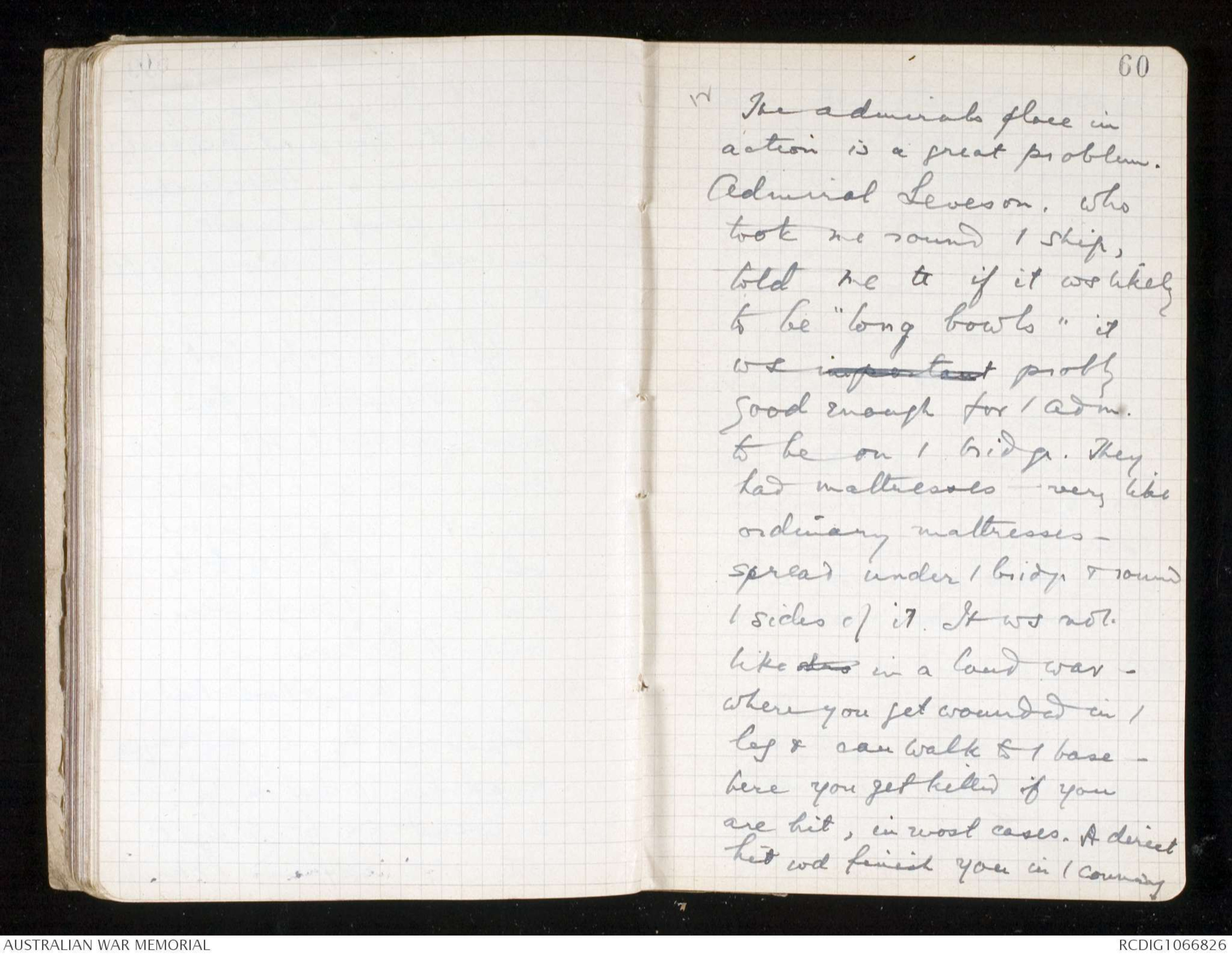
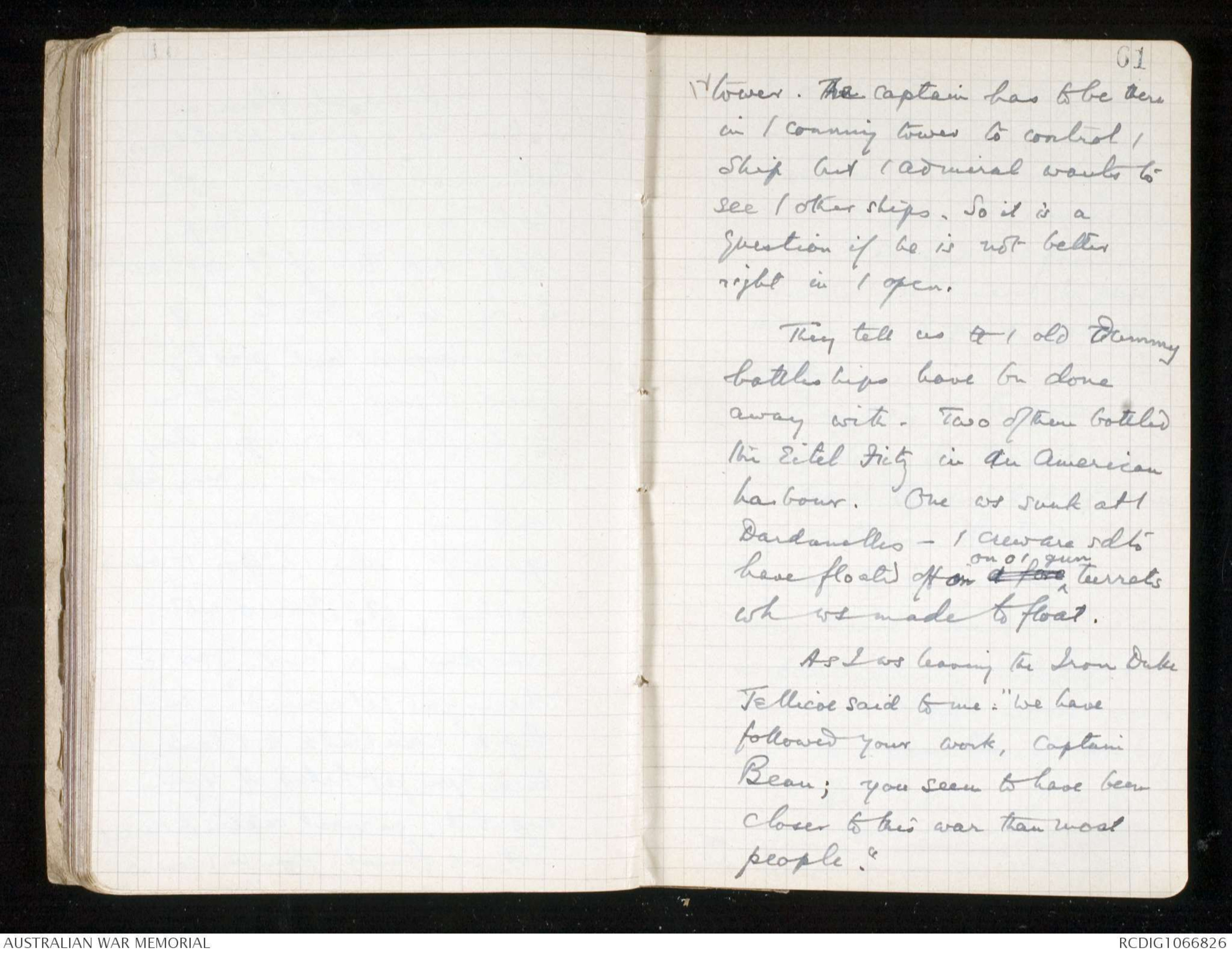
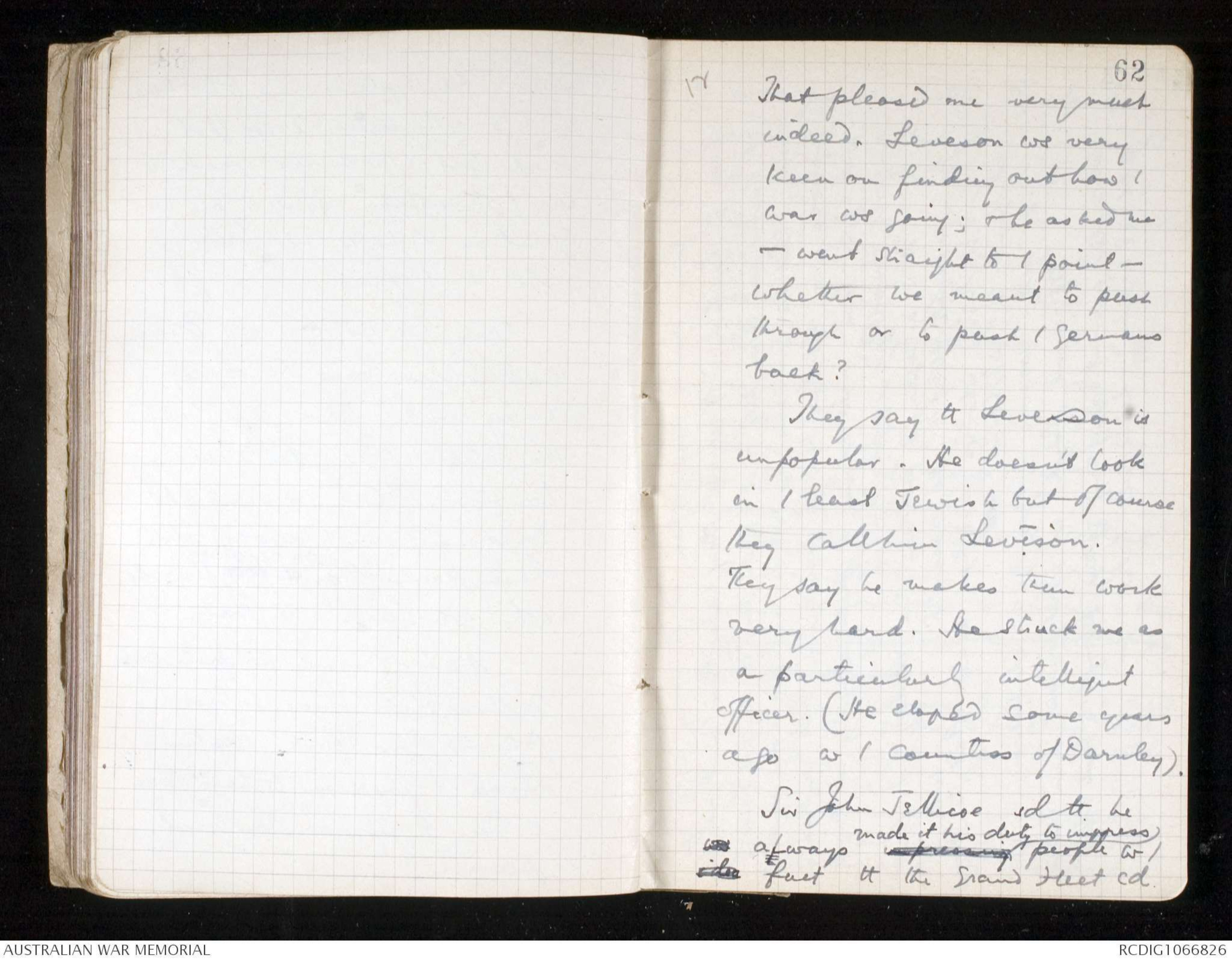
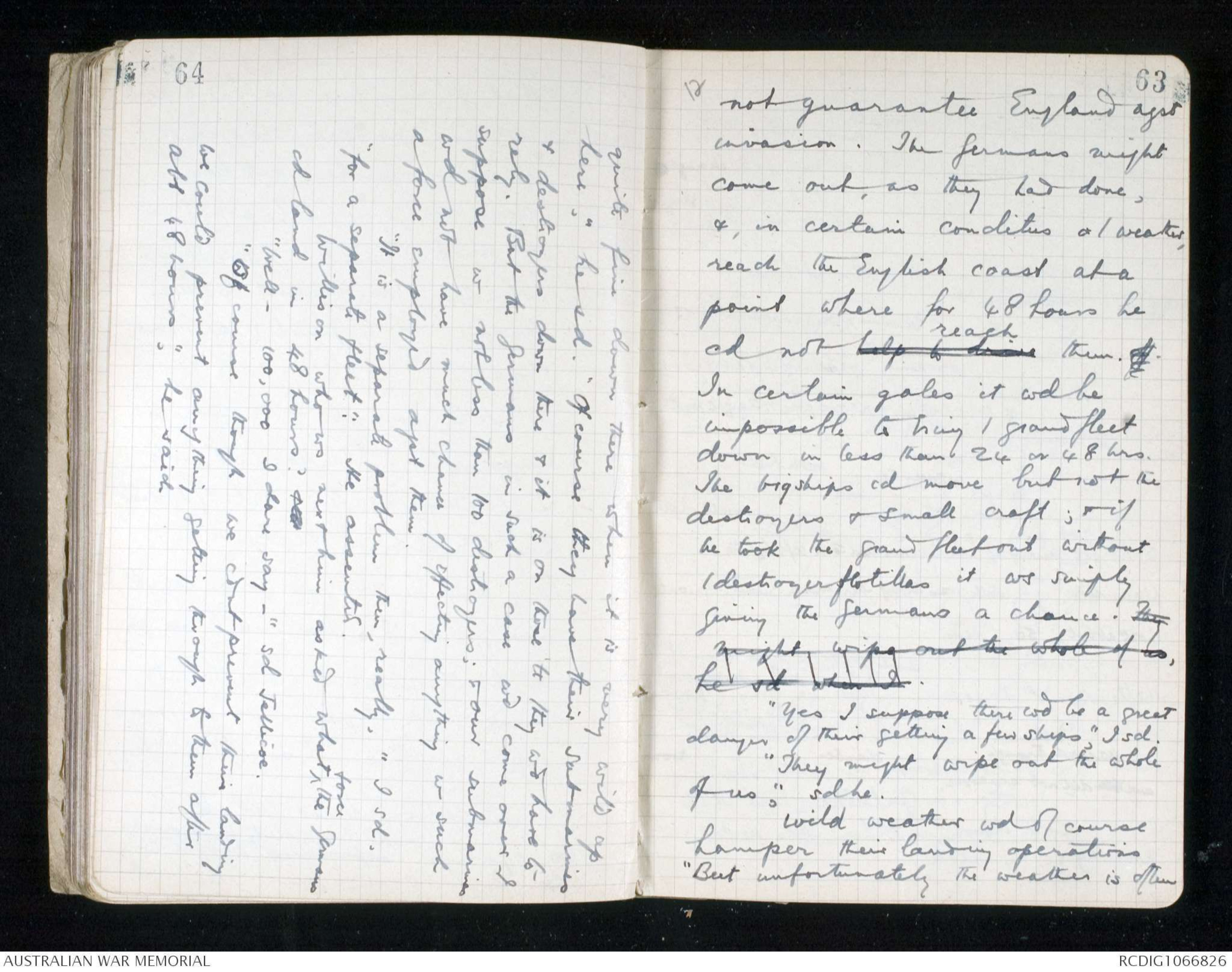
53
The German shells will
burst about 15 ft after
penetration as far as we
can tell. They wd get thro
one deck & explode on /
deck below & of course might
kill many men there
12 54
a propellant wh will not
blow up, & we have both
got part o / way to it
but it is we are not at a perfectly
satisfactory solution yet -
nor are they. But their
ships are much better
protected than ours.
I asked why the Cruiser
Squadron - not the battle
cruisers but the cruisers -
suffered so severely - ^at what
time in / battle ws it?
"When they turned down
between the two battle squadrons"
he sd. "They were ahead
of us - they were not with
the battle cruisers, but came
up w this fleet."
He said tt he cd
12 55
scarcely see anything
of our own ships cruisers
or o / enemy. One of his
great difficulties was tt
he could not see our
own ships as he came
up. He cd see the
enemys fire tt night
when our destroyers
attacked. The Germans
were on the port
quarter then. I
[The visibility ws abt
3 miles, they tell me, tt day -
as it often is in the N. Sea.They The critical point comes
when the visibility gets
lower than torpedo range
-Sir John sd - when of
course they can get a torpedo
'Hand drawn diagram - see original'
12 56
at you - not the destroyers,
but the ships.]
For our harbours, Sir John
sd, Australia wd need
destroyers & submarines.
I asked how the Australian
discipline had been.
"Excellent", he sd, "in
the ship". I told him of our
ideas of ^real discipline in the A.I.F.
"When they get on leave
ashore they are apt to paint
the town red, & perhaps", he
sd - but their discipline
has clearly not bn any
anxiety to him. "The
Australia has bn
unlucky so far", he sd.
"in missing the fight".
Leave.
12 57
I asked J. if he had any rest since
the war began. "I had 2 weeks sick
leave in Augus January", he sd,
"and six days in August to recruit.
But it is not very most inconvenient
while I was away in August the
fleet had to go out. I had to
wire to the Iron Duke to come
out o / line for me & I wd go upmeet her on a cruiser & tranship.
But when I got up there a
submarine fired a torpedo at
the Iron Duke & she could not
stop. I had to wait until
after dark & tranship then."
I heard afterwards tt Sir
John Jellicoe ws away for
5 wks undergoing an operation
at / beginning o / war, & tt he
took 3 or 4 days in London under /
name of Smith or Jones - (I dont
know if this is true) serving / Admiralty
It wdnt do to let / Germans know he ws away.
12 58
The Warspites rudder
went wrong & she
described two or three circles
at 2 or 3 knots speed.
She ws firing all / time
but she ws almost
stationary from 8 to 10
p.m. It ws an hour & a
half before she ws hit;but then she began to be
hit occasionally, later
they hit her again
& again. Their 12 in.
shells went thro' her
armour like putty
on shell blew her
Commanders cabin
bodily into / sea.
After 2 hrs she managed
12 59
to get her rudder right
& went home at 25 knots.
She arrived in Newcastle
w her poop almost
awash - drawing 9 ft
too much water.
Yet she only lost 15
men. She suffered from
fires - but chiefly cordite
fires - one in / fore
turret. The magazine
of tt turret had to be
flooded, & / guns were
out of action.
The Marlboro tho'
torpedoed by a destroyer
kept her place in the line
& went on w / fight.
She still steamed 17 knots.
12 60
The admirals place in
action is a great problem.
Admiral Leveson, who
took me round / ship,
told me tt if it ws likely
to be "long bowls" it
ws important probly
good enough for / Adm.
to be on / bridge. They
had mattresses - very like
ordinary mattresses -
spread under / bridge & round
/ sides of it. It ws not
like also in a land war -
where you get wounded in /
leg & can walk to / base -
here you get killed if you
are hit, in most cases. A direct
hit wd finish you in / conning
12 61
tower. The captain has to be there
in / conning tower to control /
ship but / Admiral wants to
see / other ships. So it is a
question if he is not better
right in / open.
They tell us tt / old dummy
battleships have bn done
away with. Two of them battled
the Eitel Fritz in an American
harbour. One ws sunk at /
Dardanelles - / crew are sd to
have floated off on a fore ^on o / gun turrets
wh ws made to float.
As I ws leaving the Iron Duke
Jellicoe said to me- “We have
followed your work, Captain
Bean; you seem to have been
closer to this war than most
people."
12 62
That pleased me very much
indeed. Leveson ws very
keen on finding out how /
war ws going; & he asked me
-went straight to / point -
whether we meant to push
through or to push / Germans
back?
They say tt Leveson is
unpopular. He doesn't look
in / least Jewish but of course
they call him Levison.
They say he makes them work
very hard. He struck me as
a particularly intelligent
officer. (He eloped some years
ago w / Countess of Darnley).
Sir John Jellicoe sd tt hews always impressing made it his duty to impress people w /idea fact tt the Grand Fleet cd
64
quite fine down there when it is very wild up
here," he sd. Of course they have their submarines
& destroyers down there & it is on those tt they wd have to
rely. But the Germans in such a case wd come over I
suppose w not less then 100 destroyers; & our submarines
wd not have much chance of effecting anything in such
a force employed agst them.
"It is a separate problem then, really," I sd.
"for a separate fleet." He assented.
Willis who ws next him asked what ^force the Germans
cd land in 48 hours XX
"Well - 100,000 I dare say -" sd Jellicoe.
"Of course though we cdnt prevent their landing
we could prevent anything getting through to them after
abt 48 hours," he said
12 63
not guarantee England agst
invasion. The Germans might
come out, as they had done,
&, in certain conditns o / weather,
reach the English coast at a
point where for 48 hours he
cd not help to drive reach them. Off
In certain gales it wd be
impossible to bring / grand fleet
down in less than 24 or 48 hrs.
The big ships cd move but not the
destroyers & small craft; & if
he took the grand fleet out without
/ destroyer flotillas it ws simply
giving the Germans a chance. Theymight wipe out the whole of us,he sd when I.
"Yes I suppose there wd be a great
danger of their getting a few ships," I sd.
"They might wipe out the whole
of us," sd he.
Wild weather wd of course
hamper their landing operations
"But unfortunately the weather is often
 Lulu B
Lulu BThis transcription item is now locked to you for editing. To release the lock either Save your changes or Cancel.
This lock will be automatically released after 60 minutes of inactivity.